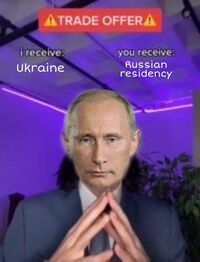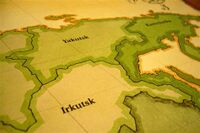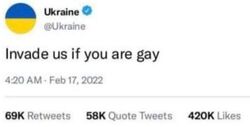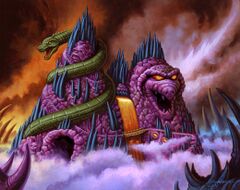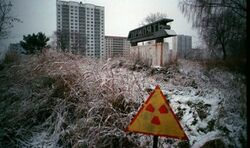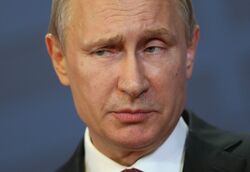2022 Russian invasion of Ukraine
The 2022 Russian invasion of Ukraine military conflict began when Russian president Vladimir Putin green-lit a "special military operation" to pacify and demilitarise Ukraine in reaction to a series of international provocations during which Ukrainian troops "gave the Donetsk region a funny look". In response, Ukrainian president Volodymyr Zelenskyy raised an eyebrow sarcastically at reports that he was the world's first Jewish head of a Nazi government.
The world awaits developments in the expectation that this invasion will follow the pattern of previous Russian special military operations, such as the 1939 Winter War in which heroic Soviet troops demilitarised around 50% of Finland by permanently stationing the Red Army in Karelia, and the 1940s KFC (Katyn Fir Cultivation) Operation, which saw the Polish Officer Corps pacified to death and buried beneath a pine forest.
Causes
Festivities could not truly get underway until the Russian Government had established a legitimate casus belli to present to its own people on state television. Ultimately, much was made of Zelenskyy's rejection of a generous free-trade agreement. According to Russian Foreign Minister, Sergei Labrov:
| “ | Was great offer. Russian Federation ask for less than 95% of Ukraine's territory, mineral rights, and airspace. In return, we give Zelenskyy blindfold before we shoot him in face. Also, no call me Sir Gay or maybe you find Polonium in your tea, понима́ешь? | ” |
—Sergei Labrov | ||
In addition, the Irkutsk and Yakutsk provinces in eastern Ukraine are full of ethnic Russians. They are sitting on a direct route to Crimea, which Russia won in a previous game. Many of these ethnics accepted complimentary Russian passports and said they voted for Zelenskyy solely to give away the country. Unsurprisingly, their fellow Ukrainians are always picking on them for the most superficial of reasons, like speaking a foreign language and brawling a lot. They invited the Russian Army in to redress these slights.
Start of the invasion
Part of the invasion force required some Russians to play dress-up as Ukrainian Police and military personnel — which was quickly seen though, as none of the undercover "Ukrainians" spoke Ukrainian, blowing their cover immediately. The official Ukraine Twitter account even went to extreme lengths to taunt the Russians by saying that invading was really gay.
To the contrary, Russian troops in the Ukraine invasion turned to Tinder for some hot, hetero, Ukraine "companionship". Ukrainian girls hooked up with them to avoid being killed during the conflict, while some said that they would "never sleep with the enemy". The Ukrainian equivalent of the CIA sent females with AIDS and/or some other STD undercover, and to get them to sleep with the horny Russian troops. Unfortunately, this did not slow the Russian advance, as the Russians lasted less than a minute in bed.
Notable battles
Attack on Snake Island
An early battle was at Snake Island, formerly home to Skeletor, claimant to the throne of Eternia and alter ego of Vladimir Putin. Reuters reports that a dozen Ukraine border guards stopped a Russian invasion force claiming to be delivering a shipment of pamphlets.
After the first wave of pamphlet delivery was checked, the Russians instructed the Ukrainians to stand down and be captured to avoid "needless casualties". The Ukrainians, taking inspiration from the classic story of U.S. Navy vs. Spanish Lighthouse, told the Russians to "go fuck yourselves" and, to put a point on it, published the retort on Twitter. Needless casualties ensued, as the Russians did not retaliate with even snappier obscenities, but instead escalated to a barrage of incendiary leafletting and armour-piercing brochures. Zelenskyy made all the border guards posthumous Ukraine National Heroes, making them the proudest corpses in Eastern Europe.[1]
- ↑ Several days later, Ukraine officials claimed that "Preliminary information that border guards may be dead came before the defenders lost contact," though the Ukrainians should not have relied on such a report, whether it came from the Russians or the border guards themselves.
Capture of Chernobyl
Russian troops occupied the Chernobyl nuclear plant, the site of the notorious total meltdown, presumably to destroy evidence of former Soviet mismanagement. The effects of the 1988 nuclear disaster have never been ameliorated; the population reduced to zero, every building left derelict, and the countryside a mere wasteland — saving Russian troops at least half their usual work. Nevertheless, Russian commanders were giddy over this easy conquest because radiation poisoning takes some time.
Competing strategies
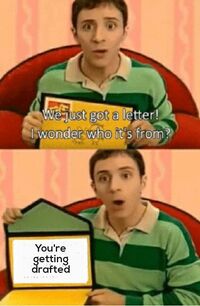
Zelenskyy, who had run Ukraine on modern European gun control, did a quick about-face and passed out 12,000 semi-automatic rifles to the citizenry. He deputized everyone between the ages of 6 and 66 and ordered them not to try to get out.
Putin had secretly studied U.S. Transportation Secretary Pete Buttigieg and how he managed gaps in the American supply chain, or would have, were it not for his sudden-onset motherhood. Ultimately, however, Putin decided his invasion would be a blitzkrieg that would succeed so quickly there was no need to think about resupplying his troops at all. This was a big problem, as Russian forces detoured from their missions to knock over supermarkets and gas stations.
In the modern era, both sides also had to give a nod to world public opinion. Russia was constrained not to bomb schools or hospitals, or at least make it look as though Ukraine were bombing its own. Zelenskyy had to get a quick fitting for camouflage and a bulletproof vest before the photographers arrived. Using Twitter to decline a Joe Biden airlift was a PR coup. He knew that the Afghanistan Vice President who exercised "the better part of valour" spent six entire months denying he had taken suitcases of cash with him.
Anonymous takes down RT
Russia had to deal with the Ukrainian military and the potential involvement of NATO, the United States, or even India. Russia's forte was cyber-hacking, but they encountered opposition on this front too: The international hacking gang known as Anonymous. The hackers' first target was the Russian news outlet RT.
For their second attack, Anonymous planned to attack brown bears with their keyboards. They later scrapped this idea as all flights into Russia were cancelled. They instead planned to hit Russian music webcasts, substituting regular programming with "Back in the USSR" on continuous loop.
Russia takes down Russia
The 1987 fall of the Soviet Union had converted Russia from communism to garden-variety gangsterism. This had two effects:
- Russia was still poorer than West, whose gangs operate with the Consent of the Ganged-up-on. If Ukraine turned into a lengthy occupation, it would cancel all the blue-light specials at к-mart for the next 4,000 weeks.
- Though Putin was a handy dictator, he had to listen to his gang leaders, the notorious, greasy Oleo-garchs. They were startled at the manpower and money Putin was spending to stitch together the old empire, only to be picked off by Ukrainian teenagers. The Oleo-garchs were able to speak their minds without the threat of imminent firing squads. Moscow began to read anti-war editorials and even see street protests.
Sanctions
While the Russians and Ukrainians fought it out, the rest of the world debated what to do about it. The United Nations took up frenzied debate, forgetting that Russia holds a veto in the Security Council. After Russia used it, members switched to frenzied debate over where to eat dinner.
All eyes turned to U.S. President Joe Biden, who retreated to his dacha in Delaware. Biden had spent all of his first year expunging every trace of his predecessor Donald Trump. This included cancelling American oil pipelines and green-lighting a Russian pipeline. Now the challenge was to punish Russia — without seeming to flip-flop on Trump. Fox News demanded the Presidential spokeswoman name any commerce Biden would actually block. She rebutted them directly — by teasing a job offer with MSNBC. Russia kept selling oil through its state corporation, Gasnost.
Some American companies stepped up and walked away from their own deals in Russia, known as "self-sanctioning". They were replaced by others, known as "bargain-hunting". In U.S. states where booze is only sold at state stores, governors ordered vodka removed from the shelves entirely, until customers asked for bottles to be brought out from the backroom.
Finally, the United Kingdom suggested Russia be excluded from the SWIFT banking system.[1] This had been done after Russia took Crimea with splendid effects, not including Russia's giving back Crimea.
Germany, which had mothballed its nuke plants and prepared for an era of Russian oil to save the planet, even refused permission for the Nord Stream II pipeline to begin operation. Thus, as Ukraine passed out AK-47 rifles, Germany passed out overcoats and quilts.
Australia made the most impactful sanctions, as Prime Minister ScoMo turned his anger away from tennis star Novak Djokovic and imposed hefty fines on eight Russian diplomats.
- ↑ Larry Kudlow said SWIFT is just a communication system like Telex, so this sanction lets Russia keep banking but tears up its monthly statements.
World War III
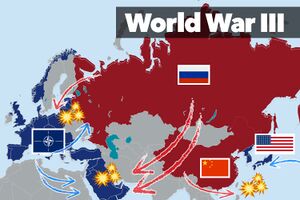
The invasion has raised hopes of leading to World War III. Fans of the cinematic franchise celebrated as Russian troops crossed the border, despite waiting 77 years for the trilogy to be completed — longer even than they did for Atlas Shrugged. As with Atlas, fans will have to deal with an entirely different set of actors in the lead roles, frumpier and more tired-looking in each installment, as the original World War stars are now demanding more lucrative deals, and Adolf Hitler, a post-credits cameo in I and the protagonist in II, has left the proverbial set entirely. Meanwhile, the producers and backers debate whether to make the storyline depend on having seen the first two installments. In addition, Germany hasn't been up to anything sneaky lately, unless you ask holders of Greek Eurobonds.
For these reasons, an alternative working title for the project is The World vs. Russia. However, even this is subject to change, as China has recently been more insistent than even Ford or Coca-Cola on control over the scripts.
| Featured version: 01 March 2022 | |
| This article has been featured on the main page. — You can vote for or nominate your favourite articles at Uncyclopedia:VFH. | |
